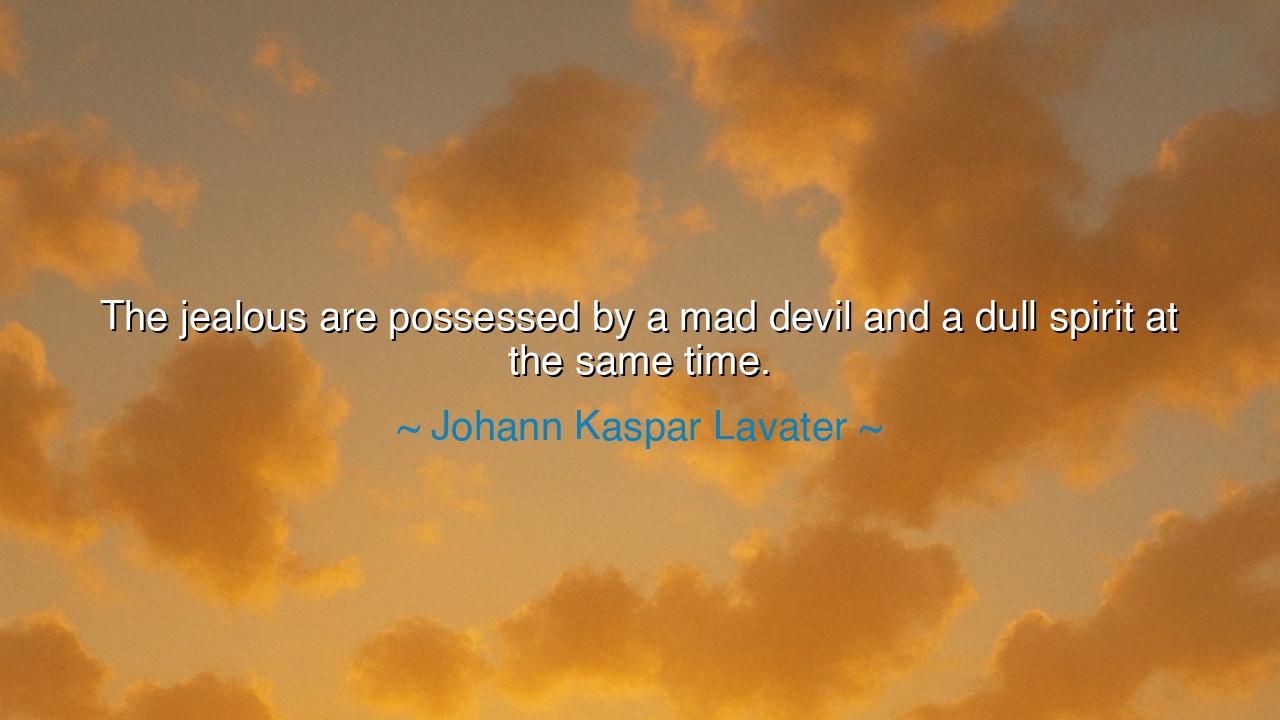
The jealous are possessed by a mad devil and a dull spirit at the






“The jealous are possessed by a mad devil and a dull spirit at the same time.” So wrote Johann Kaspar Lavater, the Swiss philosopher and theologian, a man who studied not only the features of the face but the hidden movements of the soul. In this piercing truth, Lavater captures the strange duality of jealousy — that it is both fever and paralysis, both fire and fog. The mad devil represents the frenzy of passion, the uncontrollable storm of envy and suspicion that burns within the jealous heart. The dull spirit, by contrast, is the heavy fog that follows — the weariness, the bitterness, the blindness that steals reason and peace. Thus, the jealous are doubly cursed: they are inflamed and numb, frantic yet deadened, alive to torment and closed to joy.
Lavater, writing in the eighteenth century, belonged to an age of reason, but he spoke to something deeper than logic — the turmoil of the human heart. He believed that a person’s true nature is revealed not in words but in the passions that seize them. In jealousy, he saw the most dangerous of these passions, for it carries both the madness of desire and the slowness of despair. The jealous man or woman does not think clearly; their mind becomes a battlefield where imagination fights against truth. They invent betrayals, magnify trifles, and feed upon their own fears. Yet even as their heart rages, their spirit dulls. They cannot act nobly, nor love freely; they sink into suspicion, mistrust, and exhaustion.
To understand this paradox, imagine the mad devil that Lavater describes — the fiery force that drives the jealous to anger, accusation, and torment. It whispers lies in the ear, twisting affection into agony. It says, “You are being replaced. You are being forgotten.” The jealous lover burns with this fury; their passion becomes a weapon, their affection a wound. Yet beneath this raging fire lies the dull spirit — the heaviness that keeps them chained to their suffering. They cannot rise above it, cannot see beyond it. The fire burns, but the mind is clouded. Their energy destroys itself, and they are left weary, suspicious, and small.
History gives us many mirrors in which to see this truth. Consider King Saul, the first ruler of Israel. When the young shepherd David rose in fame and song, Saul’s heart was pierced with jealousy. The mad devil within him raged — he hurled his spear at David, sought his life, hunted him across the wilderness. Yet even as he burned with fury, he became hollow within. His strength faded, his judgment faltered, his spirit darkened. The dullness of his soul consumed him until he could no longer rule himself, let alone his kingdom. His jealousy, born of pride and fear, became both his madness and his ruin.
Lavater’s insight, though born in another century, remains eternal. He saw that jealousy is a self-inflicted torment, a chain forged by one’s own mind. It is the only fire that leaves the heart colder than before. The jealous person seeks to hold what they love by force, but in their grasping, they crush it. They are ruled by a mad devil — the wild craving for control — and a dull spirit — the hopeless resignation that follows when love turns to fear. Both devour the soul, leaving nothing but ashes and silence.
But within this dark saying lies also a path toward wisdom. If the jealous are torn between madness and dullness, then the cure lies in the restoration of balance — in clarity and trust. One must silence the mad devil by mastering emotion, and awaken the dull spirit by rekindling faith. To conquer jealousy, a person must return to truth — to see the beloved not as a possession, but as a free and living soul. Love cannot be caged; it must be chosen again and again in freedom. Only the brave can love without chains. Only the wise can love without fear.
So, my listener, remember this teaching: when jealousy knocks upon your heart, know that it comes with two companions — madness and sorrow. Do not let them in. Instead, guard your mind with reason, and your heart with trust. Ask yourself: “What do I fear losing — the person, or my pride?” For it is pride that the mad devil feeds upon, and pride that the dull spirit clouds. Choose love that liberates, not love that imprisons. Let understanding temper your passion, and gratitude calm your heart.
Thus, heed the wisdom of Johann Kaspar Lavater: to be jealous is to be enslaved twice — once by passion, and again by despair. Free yourself from both, and you shall know peace. For love that is pure has no shadow of envy; it shines with quiet strength. And where such love dwells, neither mad devil nor dull spirit can enter, for the heart that trusts is stronger than all its fears.






AAdministratorAdministrator
Welcome, honored guests. Please leave a comment, we will respond soon